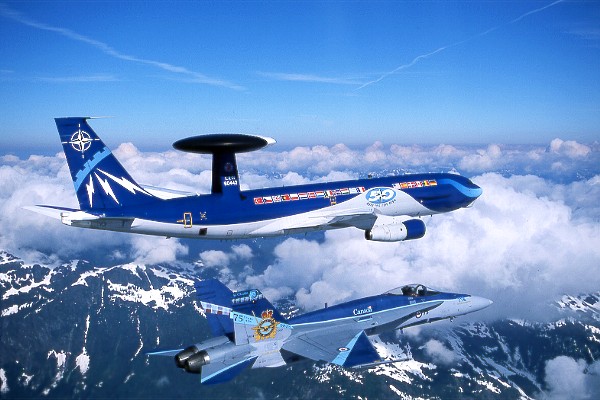Back in January of this year, Northrop Grumman awarded General Dynamics Canada (GDC) a $32 million contract for technology to be used for the NATO Alliance Ground Surveillance (AGS) programme. The AGS programme’s purpose is to give NATO commanders a picture on the ground. Unmanned aerial vehicles with advanced radar sensors and the ability to fly high-altitude and long-endurance will be used to perform persistent surveillance over areas of interest – before, during, and following NATO operations. The main operating base will be in Sigonella, Italy.
On August 22nd GDC awarded a supporting contract to Omniglobe Solutions, a Canadian communications software company in the ‘Invest Ottawa’ portfolio, to provide GDC with supporting technology. Good news all around for Canadian industry after it suffered the loss of a potential $90 million per year when Canada withdrew from funding both the Airborne Warning and Control System (AWACS) and the AGS last year in an effort to curtail spending – leaving the AGS programme’s development to be funded by Bulgaria, the Czech Republic, Denmark, Estonia, Germany, Italy, Latvia, Lithuania, Luxembourg, Norway, Romania, Slovakia, Slovenia, and the United States.
[captionpix align=”left” theme=”elegant” width=”300″ imgsrc=”http://natoassociation.ca/wp-content/uploads/2013/09/NATO_AWACS.jpg ” captiontext=”The AWACS program resulted in $180 million in contracts for Canadian companies”]
Programmes like the AGS are excellent for Canadian industry and the economy. Not only do such programmes create business for Canadian tech-companies and the defence industry, they encourage Canadian companies to stay abreast of important technological advancements to stay competitive for such contracts. This is important for the future of Canada’s tech industry and economy if Canadian companies realize there is money to be made by being smarter. Companies will be encouraged to find new, intelligent workers to innovate important defence technology, and money will flood into programmes to create these workers. But the benefit programs like the AGS have for Canadian industry would be significantly enhanced if Canada participated in its funding, thereby prioritizing Canadian companies’ bids for NATO contracts.
Proof that Canadian industry benefits significantly when Canada is on the steering committee of a NATO programme is found in its participation in the AWACS programme. Between 1992 and 2010 the Canadian government spent $161 million on the programme, which resulted in $180 million in contracts for Canadian companies – a virtual 115% return on the government’s investment. The lesson for the Canadian government is that it needs to be smart about defence budget cuts ($2.5 billion is expected to be cut from the annual National Defence budget by 2014). When expenditure has the chance to work double time as an expense and figuratively as a stimulus (in that the money ends up back in the hands of Canadian companies), the government should think twice before deciding against involvement




